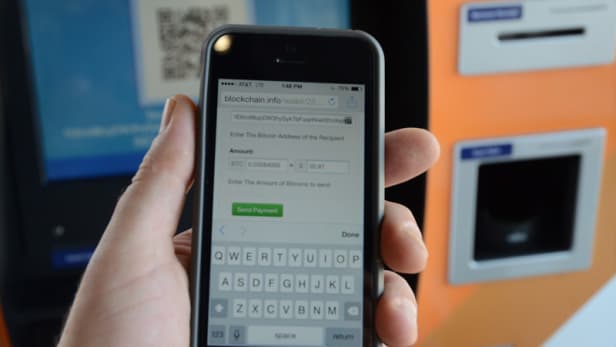By Jane Thomason
 |
| A shot of a bitcoin web wallet on an iPhone. Photo by: BTC Keychain / CC BY |
In August 2016, the World Economic Forum released a report calling blockchain technology a “mega-trend” that will shape society in the next decade, predicting that blockchains could store as much as 10 percent of global GDP by 2027. Simply put, blockchain networks allow people to transparently exchange money and valuable information digitally without central administration. It’s been called a “digital ledger” that cuts out the middleman.
This technology is attracting huge interest, but to date, almost exclusively in the commercial space. There are a few organizations dipping their toes into its uses for the poor, including Save the Children in humanitarian settings, as well as UNICEF. The Blockchain Alliance for Good is a membership group promoting the use of Internet-of-Value and blockchain technology for good social and environmental outcomes. Disberse is working on smart contracts to distribute donor finance in a transparent way while CASHAA is building a no-fee remittance system for the remittance market and has launched in Nigeria and India. There are plans to launch Sustainable Development Goals Coin at the United Nations.
We believe that blockchain has tremendous potential to provide scalable solutions in the areas of:
Digital currencies and financial inclusion. This would reduce the transaction costs for remittances, giving the unbanked access to financial systems and ensuring that funds intended for the poor actually reach them.Legal identity. Legal identity is a fundamental human right and is often a prerequisite for financial inclusion, access to services, movement of people and a multitude of things we take for granted, yet many millions of people worldwide do not have a legal identity. The potential to confer a permanent immutable record of identity in the blockchain owned by individuals could be game-changing.Land registration and digitization of assets. Many poor communities own land and assets, but they are not able to convert that into value. Through digitization of assets, people can borrow to improve their livelihoods. And, an immutable record, once established, means that ownership is unambiguous.Smart contracts to ensure that money reaches the intended recipients. Smart contracts have many applications, but one of immediate interest is in ensuring that donor funds reach intended recipients in a transparent way without middlemen and leakage along the way.
Having said this, blockchain’s potential for social impact is yet to be realized, with few use cases in developing countries. Our focus needs to move from the underlying technology to exploring use cases — then moving up to business cases — and looking for solutions that can scale.
There are many practical questions to be answered in settings with little internet access and electricity. There is also the matter of finding emerging economy institutions that want to pilot the technology.
Our focus over the next year will be finding willing partners (both problem holders and those with the technology that can be scaled), and to run some rapid prototyping in emerging markets to develop those use cases — testing the viability, desirability and feasibility of blockchain solutions in developing countries.
It’s time to connect with disruptive innovators and those who dare to believe that new technologies can transform the world for the better.
At the same time, we want to help nurture and develop the nascent ecosystem that connects the blockchain systems in advanced economies with those that work with the intractable problems of poverty and inequality.

1 comment:
If any looking for blockchain development company then visit us at Sara Analytics
Post a Comment